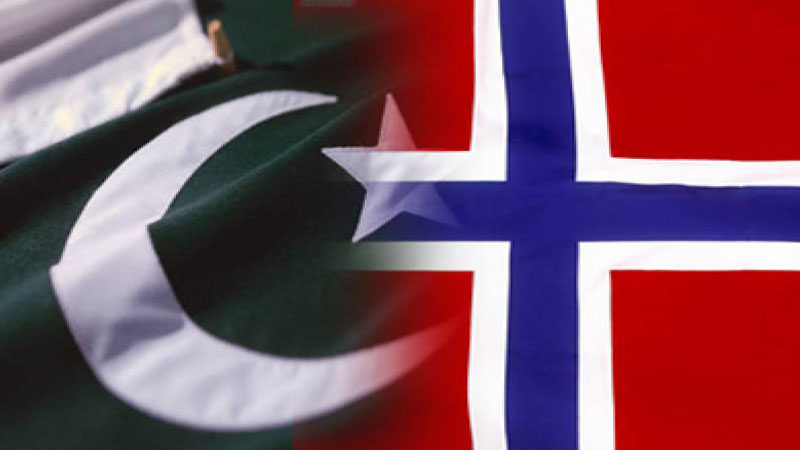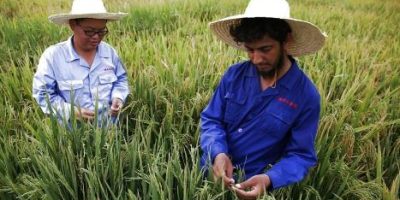Norway, Pakistan Relations

Norway and Pakistan: A Comparison
Norway and Pakistan have good and close relations, but are two very different countries. Norway is a country with a Christian-humanist heritage located in northern Europe and Pakistan is a mainly Muslim country in South Asia. The distance between the capitals, Oslo and Islamabad, is 5,300 km. The geographical area of Norway is 385,000 km2 and that of Pakistan about 882,000 km2.
Norway has some 5.2 million inhabitants, whereas about 208 million people live in Pakistan. Norway is a rich developed country and Pakistan is a middle-income developing country. According to the World Bank, Norway’s nominal gross domestic product in 2015 was USD 388 billion, compared to USD 270 billion for Pakistan. The Norwegian GDP per capita in 2015 was USD 74,482 and Pakistan’s USD 1,435.
Diplomatic relations
The bilateral, diplomatic relations between Norway and Pakistan are good. Norway recognized Pakistan as a sovereign state in 1947, shortly after its foundation. For many years, Norway only had an honorary consulate general in Pakistan, located in Karachi.
However, in 1976 an embassy was established in Islamabad, headed by an acting ambassador (chargé d’affaires). Norway’s first resident ambassador in Islamabad, Mr Jan Erik Leikvang, arrived in 1995. Today, Norway has honorary consulates in both Karachi and Lahore, in addition to the Embassy in Islamabad.
In recent years, there have been frequent consultations and exchanges of visits between the two countries. Prime Minister Nawaz Sharif visited Oslo in 2015, and Norway’s Foreign Minister Børge Brende visited Islamabad in 2015 and 2016. In April 2017, bilateral consultations between civil servants from the respective foreign ministries took place in Oslo.
The Pakistani diaspora in Norway
Norway and Pakistan have close people-to-people relations. Immigration to Norway from Pakistan started in the late 1960s. However, since 1975, immigration has mostly been allowed only in cases of family reunification or family establishment. Today there are nearly 40,000 persons living in Norway who were either born in Pakistan or both of whose parents were born there.
Most of the Pakistani diaspora in Norway hails from Kharian and elsewhere in the district of Gujrat. They are well integrated in Norwegian society.
E.g. their education level and home ownership are close to or above the Norwegian average. Notably many second-generation Norwegian-Pakistani women attend higher education. Quite a number have attained prominent positions in Norwegian political and professional life.
At the Norwegian Embassy in Islamabad, a special attaché is working to prevent cases of forced and under-age marriages involving nationals from the two countries, in cooperation with the Pakistani diaspora in Norway and local authorities in Pakistan.
Historical connections
Apart from the migration of Pakistanis to Norway in recent times, there are also earlier historical connections between the two countries. Two examples may be mentioned.
Georg Valentin von Munthe af Morgenstierne (1892-1978) was a Norwegian professor of linguistics at the University of Oslo. He specialized in Indo-Iranian languages.
In 1924, Morgenstierne visited Peshawar and Kabul, where he stayed for half a year, working on what became an etymological dictionary of Pashto. He arrived in Kabul with a personal letter of introduction to the King of Afghanistan from the King of Norway.
Morgenstierne also did research on the Indo-Iranian frontier languages of northeastern Afghanistan and northwestern Pakistan. In 1929, he returned to Baluchistan, Peshawar and Chitral, where he also studied the religion of the Kalash people in the Rumbur Valley.
Together with linguistic studies, Morgenstierne collected remarkable scientific materials from the culture of the regional people, like images, movies from pre-Islamic ceremonial dances and sound recordings of nearly extinct languages. The materials are available in his database at the National Library of Norway.
Fredrik Barth (1928-2016) was a Norwegian professor and pioneer of social anthropology, who, among many other things, contributed significantly to the international understanding of Pathan culture. He came to the Swat Valley in 1954 and kept returning until the 1980s.
The subject of his PhD dissertation from 1959 was the political organisation of the Swat Pathans. In 1985, he published the book “The Last Wali of Swat”, together with Mihangul Jahanzeb.
In 1950, the famous Norwegian philosopher and mountaineer Arne Næss scaled the highest (eastern) peak (25,263 ft/7,708m) of the mountain Tirich Mir in the princely state of Chitral. In 1964, another team of Norwegian climbers led by Ralph Høibakk scaled Tirich Mir’s second highest (western) peak (25,237 ft/7,692m).
Trade and investments
Trade between Norway and Pakistan is modest, but increasing, and the balance is in favour of Pakistan. In recent years, the trend has been that Norway has imported more from, and exported less to, Pakistan. Pakistan exports mostly traditional goods, such as textiles, leather-goods and sugar, to Norway. The biggest Norwegian exports to Pakistan are fertilizers, machines, aluminium and iron/steel.
In 2017, the value of Norwegian imports from Pakistan was NOK 777 million (USD 105 million), up from NOK 623 million in 2016. Norwegian exports to Pakistan in 2017 were worth NOK 164 million, and in 2016 NOK 92 million. The value of total bilateral trade in 2017 thus was NOK 941 million (USD 128 million), up from NOK 715 million (USD 97 million) in 2016 .
Due to its Pakistani diaspora, Norway is the fourth most important source of remittances for Pakistan in Europe. The value of such remittances from Norway was about USD 40 million in 2017.
Norway has accorded Pakistan GSP status (Generalised System of Preferences of the European Union, Norway and Switzerland), meaning that Pakistani goods benefit from a 10-100 per cent tariff reduction when imported into Norway. The EFTA States Iceland, Liechtenstein, Norway and Switzerland signed a Joint Declaration on Cooperation with Pakistan in Geneva, Switzerland, on 12 November 2012. As a follow-up, negotiations on a trade agreement are being considered.
However, due to the extensive activities of the Norwegian mobile phone operator Telenor in Pakistan, Norway has invested considerable sums in the country. In fact, in the period from June 2015 to June 2016, Norway was the source of the largest foreign direct investment in Pakistan, investing a total of USD 173 million.
Telenor is by far the largest Norwegian company present in Pakistan. Since its establishment in 2005, the company has invested about USD 3 billion in Pakistan, and currently has some 40 million customers here.
Telenor is the second biggest mobile operator in Pakistan. In June 2016, Telenor won an auction of the 850 MHz-band, which it is using to introduce 4G services. The bid amounted to USD 395 million, which will be invested in the next few years.
In 2015, the Norwegian solar power company Scatec Solar signed a Memorandum of Understanding with a Pakistani partner, Nizam Energy, stating its willingness to establish a solar power plant with a capacity of 150 MW in upper Sindh province. The investment would amount to about USD 200 million. Implementation is still being discussed.
In 2016, the Norwegian company Höegh LNG entered into a contract to deliver a Floating Storage and Regasification Unit (FSRU) to a private Liquefied Natural Gas (LNG) terminal in Port Qasim, to the west of Karachi. Similarly, the partly Norwegian shipping company BW Group has committed to providing Pakistan Gas Port Ltd with an FSRU for 15 years at the public terminal at Port Qasim. The main other Norwegian companies active in Pakistan are:
• Nera Networks, providing services and equipment to the telecommunications sector
• Jotun Paints, producing paint at a modern factory near Lahore
• Brighterlite, leasing solar power solutions to individual households
• The Varner Group, contracting garments from various Pakistani textile factories.
• Bokhari (NorPak International), producing and exporting rugs and other handicraft textile products from Pakistan to Norway.
Development assistance
Norwegian bilateral development cooperation with Pakistan started already in 1969, before the establishment of the Embassy. In recent years, Norway’s total development assistance to Pakistan has been at an annual level of some USD 40-45 million, most of it provided through multilateral channels like the United Nations or the Global Alliance for Vaccines and Immunization.
Bilateral assistance in 2018 constitutes about USD 10 million. Total Norwegian development assistance to Pakistan from 1969 to 2017 amounted to some USD 625 million.
The priority sectors for bilateral aid today are education, women and gender equality, human rights, and prevention and mitigation of natural disasters. For reasons of efficiency and manageability, it is the Embassy’s policy to support fewer, but larger projects, preferably in cooperation with other donors.
Visa and consular affairs
Citizens of both countries need a visa to visit each other’s’ territories, with the exception of persons having diplomatic or service passports. In 2017, the Norwegian embassy in Islamabad received 2671 visa applications, compared to 2797 in 2016. The rate of rejections is about 40 percent.
The number of applications for family reunification was 511 in 2017 and 624 in 2016. Requests for consular assistance to Norwegians in Pakistan have increased.
Police cooperation
Over the years, a quite extensive cooperation between the Norwegian and Pakistani police forces have evolved. Cooperation is necessary as crimes committed in one of the two countries often involve the other country, and criminals travel from one country to the other. A police liaison officer at the Norwegian Embassy in Islamabad deals with such cases, also serving the other Nordic countries (Denmark, Finland, Iceland and Sweden).
Among cases handled recently involving both Norwegian and Pakistani citizens are the so-called Triple Murder Case, the Lime Case (human trafficking, etc.) and Operation Tøyenløftet (drugs trafficking, money laundering, etc.). Other cases often involve child abductions and forced marriages.
In order to enhance the capacity of the Pakistani police, the Norwegian Embassy has provided technical and advisory assistance, notably to the police in the province of Punjab. Norway has proposed a Memorandum of Understanding (MoU) on police and justice cooperation to Pakistan’s authorities.
Related News

China Exports Drop More Than Expected in Setback to Recovery
Islamabad, Apr 12 (DNA): Experts lauded China’s role in advancing Hybrid Rice cultivation in Pakistan,Read More

PSX closed at historic high level of 69,619 points
ISLAMABAD, Apr 8 (APP/DNA): The 100-index of the Pakistan Stock Exchange (PSX) continued with bullishRead More


Comments are Closed